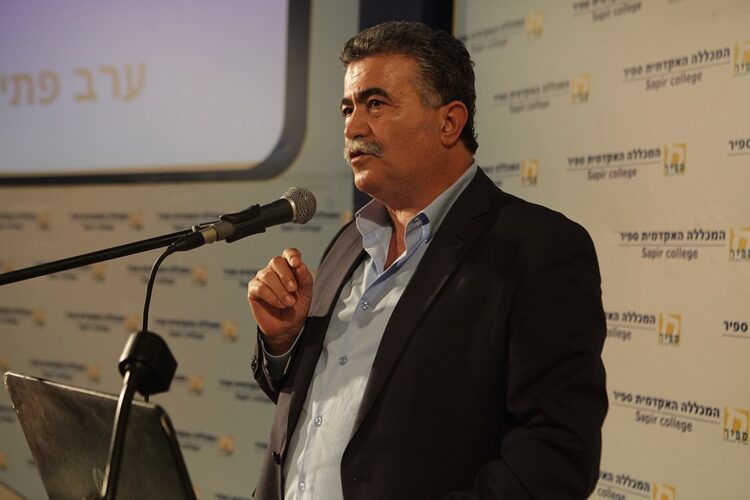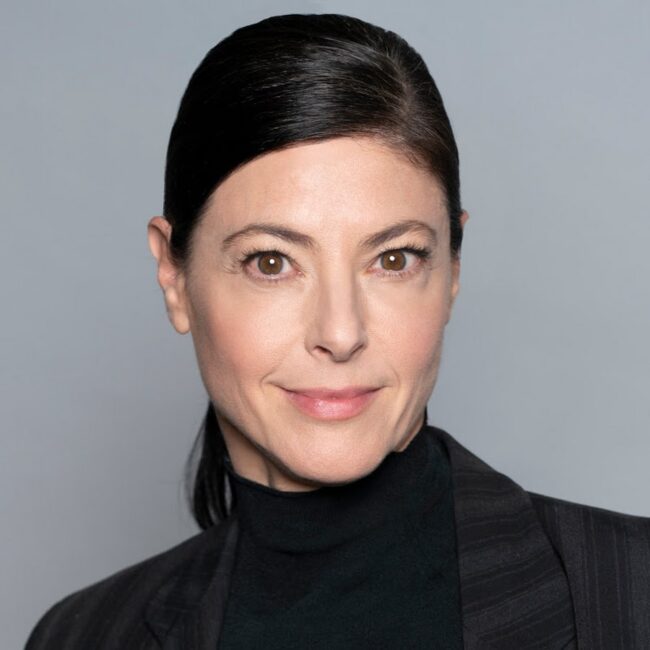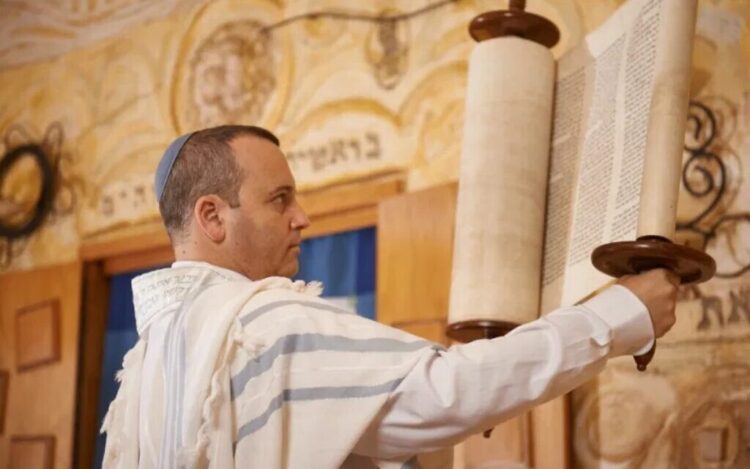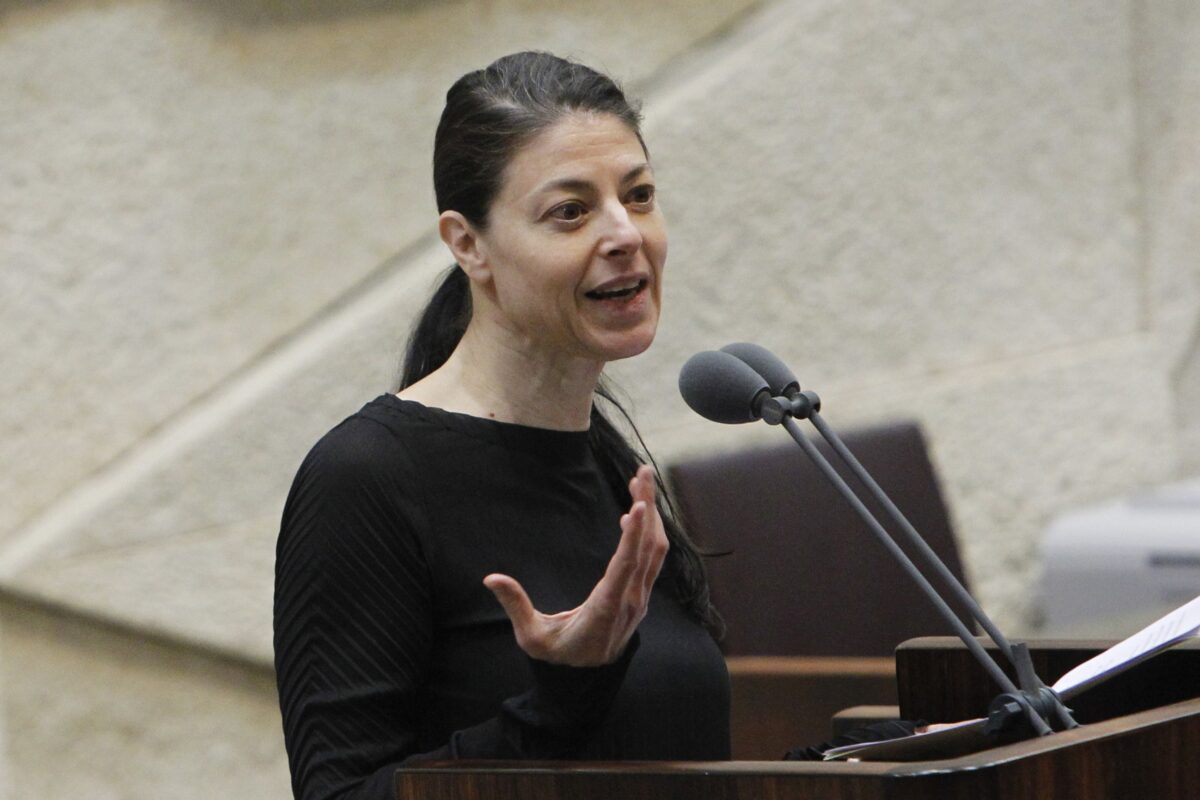With the March 23 election in Israel looming, Merav Michaeli, the new leader of Israel’s once dominant Labor Party, is working to restore it to its former preeminence.
“The Labor Party is back on its feet,” she said during a Zoom lecture on February 25 sponsored by the American Friends for Peace Now. “We’re at the beginning of a journey to make the Labor Party a leader in the center-left camp. We need to take back our historic leadership role.”
Michaeli, Israel’s only female party leader today but the third woman to head the Labor Party, assumed her position last month after her predecessor, Amir Peretz, resigned.

Peretz caused a revolt in the Labour Party after breaking his election campaign promise not to join Prime Minister Benjamin Netanyahu’s right-wing coalition government. In exchange for his defection, Netanyahu appointed Peretz as minister of economics. Peretz’s colleague and fellow defector, Itzik Shmueli, was given the post of minister of welfare by Netanyahu.
After their joint departure, Michaeli withdrew the Labor Party from Netanyahu’s caretaker government.
Michaeli, a former journalist and television host elected to the Knesset in 2013, said that Peretz’s betrayal was not his only sin. Peretz sought to merge the Labor Party with the centrist Blue and White Party, which is headed by Benny Gantz, the defence minister in Netanyahu’s cabinet.
Michaeli, 54, said that when she succeeded Peretz as its fifth leader in a decade, the Labor Party was in lamentable shape financially and organizationally. “A lot of people told me it was dead,” she said, referring to its drastic decline in recent years. “But I knew the opposite was true.”
There is a deep yearning in Israel for a party Israelis can trust, said Michaeli, a social justice champion who supports women’s and LGBT rights. “Our slogan is truth in politics. We hope this works for us.”

In the last three inconclusive elections, which took place in April and September 2019 and in March 2020, the Labor Party fared quite poorly, winning six seats or less in the 120-seat Knesset, a disappointing result for a party that ruled Israel with coalition partners from the advent of Israeli statehood in 1948.
Shortly after the 1967 Six Day War, the Labor Party won 49 seats. It lost its first election in 1977 when the right-wing Likud Party, led by Menachem Begin, registered a stunning victory. With Yitzhak Rabin at its helm, it captured 44 seats in the 1992 election. The Likud, with Netanyahu as its leader, returned to power in 1996, but Ehud Barak lead the Labor Party back to power in 1999, winning 23 seats.
In 2013 and 2015, it won 13 and 19 seats respectively. But since 2019, it has been in free fall, with commentators constantly forecasting its demise.
Three days ago, a Channel 13 survey predicted it would win six seats in the next election.
Upon becoming its leader, Michaeli attributed its decline to years of “incitement and delegitimization” by Netanyahu. But she acknowledged that some of its mistakes, notably its penchant to join right-wing governments whose values were contradictory to its own, were self-inflicted wounds. In effect, the Labor Party became an enabler of right-wing governments, she noted.
With less than a month left before the March election, Michaeli is busy rebuilding the party’s base.

She has recruited two newcomers to run for election — Rabbi Gilad Kariv, the head of the Reform movement in Israel, and Ibitsam Mara’ana, a Muslim filmmaker from the Arab village of Fureidis, near Haifa, who is married to a Jew.
Kariv could be the first Reform rabbi to sit in the Knesset, she said.
Mara’ana is a somewhat controversial figure. Formerly a member of the left-wing Meretz Party, she criticized Israel’s invasion of the Gaza Strip in 2009 and described Gaza, which has been besieged by Israel since Hamas’ takeover in 2006, as “a ghetto under cruel occupation.” Recently, she called the Israeli army “the occupation army” and accused its soldiers of murdering a Palestinian child.
In defence of Mara’ana, Michaeli said she joined the Labor Party, a Zionist party, to build a “common Jewish-Arab future” in Israel.
Michaeli has said she will not rule out the possibility of joining a coalition government that would include Gideon Sa’ar’s right-wing New Hope Party or ultra-Orthodox parties like Shas and United Torah Judaism.
“I do not exclude any part of Israeli society,” she said recently. “Not Arabs, not Orthodox, not anyone.” While she is adamant against forming an alliance with Netanyahu, she is open to cooperating with other parties, even those at ideological odds with the Labor Party.
As she put it, “I cannot rule it out because it’s obvious that if the outcome of the election is such that it will be a possibility to replace Netanyahu, I think everybody understands that this is a very, very important step for Israel.”
She added, “Concessions will have to be made, and I may have to be a part of a coalition that contains parts of Israeli politics that I deeply, deeply disagree with.”
An advocate of a two-state solution, Michaeli said that Israel must resolve its conflict with the Palestinians to assure its security, though it is not currently a pressing issue due to the coronavirus pandemic wreaking havoc on the country.
Asked to comment on the Jewish National Fund’s recent decision to allocate the equivalent of $11.58 million to buy land in the West Bank, she said, “It’s very dangerous and unfortunate.”
Michaeli blasted the International Criminal Court for having decided it has jurisdiction to investigate what may be Israeli war crimes in the West Bank. “It was a very, very problematic decision and doesn’t promote peace. It escalates the conflict. Peace can’t be achieved through a court ruling.”
